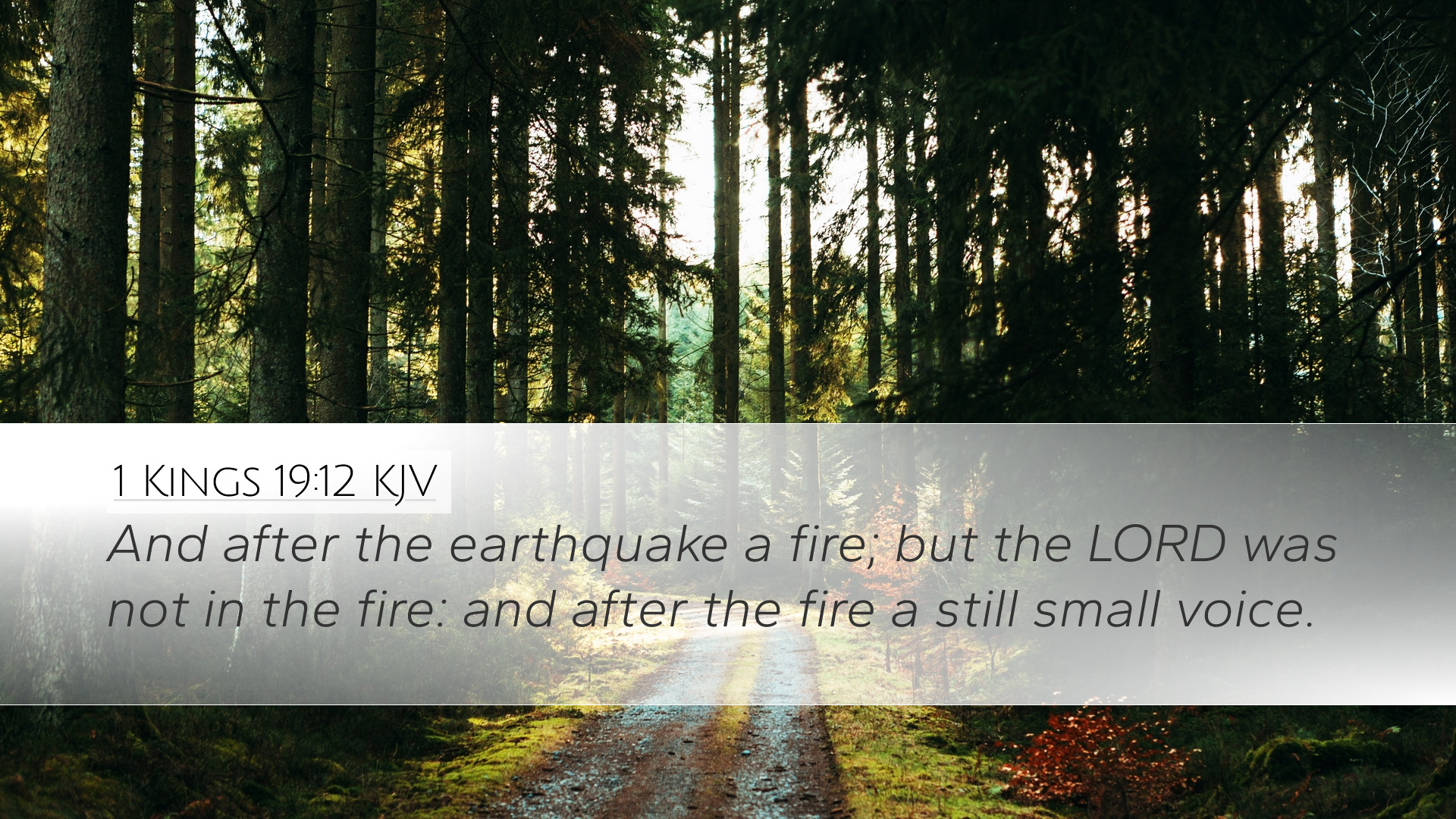Old Testament
Genesis Exodus Leviticus Numbers Deuteronomy Joshua Judges Ruth 1 Samuel 2 Samuel 1 Kings 2 Kings 1 Chronicles 2 Chronicles Ezra Nehemiah Esther Job Psalms Proverbs Ecclesiastes Song of Solomon Isaiah Jeremiah Lamentations Ezekiel Daniel Hosea Joel Amos Obadiah Jonah Micah Nahum Habakkuk Zephaniah Haggai Zechariah Malachi1 Kings 19:12
1 Kings 19:12 KJV
And after the earthquake a fire; but the LORD was not in the fire: and after the fire a still small voice.
1 Kings 19:12 Bible Commentary
Commentary on 1 Kings 19:12
Verse Context: In 1 Kings 19:12, we find the prophet Elijah at a pivotal moment in his ministry. He is in a state of despair after fleeing from Jezebel, grappling with his sense of failure and isolation. This verse describes a critical experience known as the “still small voice,” which serves as a profound revelation of God's presence and communication.
Overview of the Commentary
This commentary seeks to explore the depths of 1 Kings 19:12 by drawing insights from various public domain commentaries, particularly those of Matthew Henry, Albert Barnes, and Adam Clarke. Each of these commentators offers unique perspectives on the significance of the still small voice, its implications for understanding God’s nature, and its relevance for believers today.
Detailed Commentary
Understanding the Context (1 Kings 19:11-13)
Verse 12 is situated within a narrative that highlights the stark contrast between external manifestations of power and the quiet voice of God. Prior to this moment, Elijah experiences a series of dramatic phenomena—winds, earthquakes, and fires—representing chaos and divine might. However, God is not found in these turbulent displays.
- Matthew Henry: Asserts that God often works in subtler ways, contrasting human expectations of grandeur with His preference for quietude and humility.
- Albert Barnes: Emphasizes that the external manifestations could symbolize the tumult in Elijah’s mind and spirit; however, God chose to reveal Himself through stillness.
- Adam Clarke: Notes that the “still small voice” indicates God’s approachability and willingness to speak to His servants in ways that are not overpowering but are deeply personal.
Theological Insights
The nature of God's communication in 1 Kings 19:12 offers meaningful insights into His relationship with humanity:
- Presence of God: God’s presence is both majestic and intimate. While He is capable of dramatic interventions, He often chooses to interact in gentle and personal ways (Henry).
- Spiritual Discernment: The challenge of discerning the voice of God amid life’s noise is paramount. Believers are called to cultivate spiritual sensitivity to recognize divine guidance (Barnes).
- God’s Comforting Nature: The still small voice is illustrative of God’s compassion. Elijah’s moment of despair is met with a gentle reminder of His constant presence (Clarke).
Implications for Believers
This verse prompts significant reflection for pastors, students, theologians, and Bible scholars regarding the ways in which God speaks to His people:
- Listening in Silence: Believers are encouraged to intentionally seek moments of solitude and silence to hear from God, thus emphasizing the importance of contemplative practices in our faith (Henry).
- Rejecting Noise: The distractions of modern life can hinder our ability to hear God's voice. The call to drift from chaos towards quietude is essential for spiritual growth (Barnes).
- Confidence in Divine Guidance: Even when circumstances seem dire, God is attentive and responsive to His servants’ needs. This assurance can spur believers on in their journeys (Clarke).
Conclusion
In summary, 1 Kings 19:12 transcends its historical context to deliver profound spiritual truths for contemporary believers. The revelation of God's presence as a still small voice invites reflection and action, urging us to cultivate an attentive heart eager to listen. These insights from esteemed commentators enhance our understanding, deepening the appreciation of God’s intimate relationship with His prophets and, by extension, His people today.


